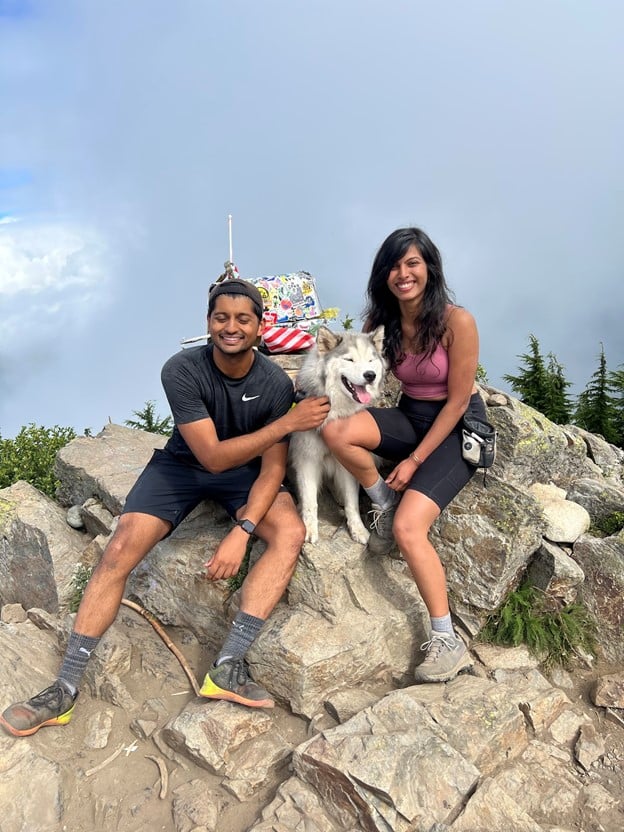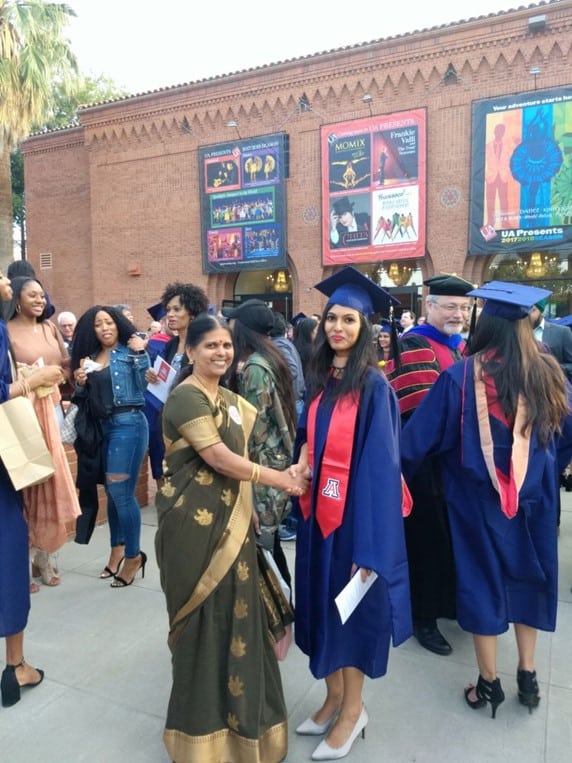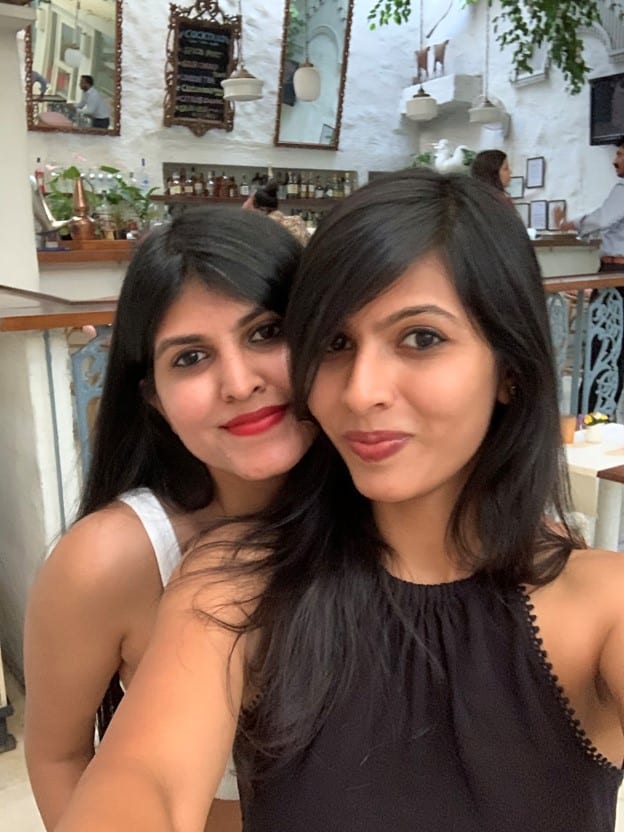Contents
Hello! Who are you?
Hi! I’m Sharanya Ramakrishnan, a 31-year-old woman living in Seattle, USA with my wonderful fiance and our 3-year-old Siberian Husky boy, Archer.
I work for Amazon Web Services as a Senior Tech Product Manager. I moved to the United States in 2016, to pursue my Master’s degree and have lived here since, building my career in tech, like so many others.
I grew up thousands of miles away in Bangalore, India, with doting parents whose lives revolved (and still do, to be honest) around my younger sister and me. They both worked very hard to provide us with all the opportunities we could ask for.
My dad has always been my biggest cheerleader. In his mind – there’s nothing his daughter can’t achieve if she wants to. My mother has been an absolute inspiration – though her education was cut shorter than she’d have liked, she used her thirst for knowledge to build a career she absolutely loved. Growing up, my sister and I had our love-hate phases but now, she is my person. I can’t imagine life without her.
I feel grateful to live in the Pacific Northwest because I get to enjoy the great outdoors. I spend my weekends hiking, reading, volunteering, and exploring Seattle neighborhoods on long walks with my dog.
Archer and I welcomed my fiance into our lives about 2 years ago. I treasure the little moments we spend together as a family. They’re the ones who keep me going through life’s good and bad days.
When someone asks me, “Are you happy?”, I often say that I definitely am, based on my definition of happiness. I’ve realized that for me, happiness is being at peace mentally.
Having gone from a cheerful, easy-going yet ambitious young woman in her early 20s to an anxious, self-critical adult with low self-confidence in her late 20s to my present self now, I can say that I am grateful, therefore I am happy.

What is your struggle and when did it start?
My struggle with Anxiety and Depression started with a mini-panic attack in early 2017. While it continued with minor instances, I hit my worst phase in late 2020 and struggled through most of 2021.
I was officially diagnosed with Clinical Depression in early 2022 and have been on antidepressants since October 2022. Yes, it sounds like a calendar of events, Depression milestones of sorts.
But what most people may not understand is that you never know when you’re going to have a panic attack. You never know when you’re going to wake up next with a horrible knot in your stomach, not wanting to leave your bed because that means your day has begun.
You, like me, may not even realize you’re HAVING a panic attack the first time. I still have the image etched in my mind. It was during my Masters and I had an assignment due in 6 hours. Simple, easy one which would probably take me an hour to complete.
But, for whatever reason, I sat there on my chair, feeling my hands and feet get very cold. I was scared but couldn’t logically explain why. It felt like I froze, mentally. I was numb.
Since then, I’ve had panic attacks ranging from cold hands and feet to lying on the floor crying my eyes out as a knot in my chest grew bigger and left me gasping, unable to breathe. But these are instances.
The part that was hardest to deal with was waking up every day, for months, going through your day, and doing the bare minimum. Because I just could not find a reason to do anything. I did not have the energy to live my life and that crushed me the most.
Until I planned to leave home and move to the United States, life was a very balanced game of effort and reward. I worked hard in school, was consistently among the top students, and reaped my rewards in terms of appreciation and awards, job offers, etc.
The first blow was when I walked up confidently for my F1 student visa interview, with stellar grades and an admission to a University ranked among the top 5 in the US for my course, only to be rejected without any explanation.
This hit me hard. I’d done everything academically to stay on the path I’d dreamed of and convinced my parents, who had second thoughts about me living all alone in a new country so I was mentally preparing myself for the upcoming new chapter in life.
I managed to re-apply for my Visa and make it the same year to grad school. But, this was the first time in my life when I learned that it isn’t always an effort = reward game.

Fast forward a few years, a few more life lessons but mostly a good life overall, and then came the time when all our lives came to a standstill. The Pandemic of 2020.
What started off as a week of working from home, while visiting my then (now ex) fiance was the beginning of the darkest phase of my depression. In 2020, I got stuck in Seattle for months, away from my home in the Bay Area where I was working then.
Coincidentally, I ended up interviewing and landing an offer with AWS and decided to move cities in mid-2020. So, I left behind the place that felt closest to home since my time in the US, the Bay Area, and all my friends.
I moved to Seattle, a city where I barely knew anyone, thinking it might be a good time to live with my fiance before getting married in November 2020.
So, we started living together and I began my journey at AWS with an overdose of anxiety and imposter syndrome in July 2020. I let my love for dogs overrule my practicality and we got a puppy together, my first dog ever, Archer, in August 2020.
And somewhere between juggling a highly competitive tech job, raising a pup for the first time (a high-energy husky at that), struggling to communicate with my partner, and feeling isolated without my support system of friends during the pandemic, I slipped into what felt like a hopeless abyss.
Externally, people saw someone with a successful career, a relationship inching towards the wedding, and a beautiful pup to add to the joy. Internally, it was anxious days with constant self-doubt at work and a relationship that was crumbling under the weight of the pandemic.

We pushed out the wedding, eventually ending the engagement and I moved out, to live alone for the first time with an almost 1-year-old pup to take care of. My parents, like most Indian parents, viewed their daughter getting married as the mark of successfully raising their child.
It broke their heart when they learned about the break-up. It was the hardest few months of my life. But, this phase also pushed me on a journey of self-discovery, reflection, growth, and healing.
I’ve been in therapy for almost 2 years now, with weekly therapy sessions and daily medication. I can now confidently say that I have the ability to tackle whatever life throws at me and hope that I don’t experience a drawn-out phase of struggle like before.
I still have days every couple of weeks when I feel empty inside but know how to help myself out of it. Panic attacks are still slightly more difficult to handle but having my anxiety medication handy has helped immensely.
How did this struggle make you feel at your worst moments?
My struggle with Anxiety and Depression impacted every facet of my life. There have been days when I felt so unlike the “me” I knew my whole life that I stopped and questioned when I changed so much.
I went from seeing myself as a carefree and confident optimist to a paranoid, underconfident person. I questioned everything from my job offers to my promotion and felt like I didn’t deserve them.
My anxious-avoidant attachment style coupled with depression during the pandemic had a drastic impact on my relationship choices. I didn’t stand up for myself and willingly gave up my time and energy, seeking validation.
Ultimately, I was in a place where nothing really excited me or made me happy anymore, I felt like I had no purpose in life. My only reason to get out of bed in the morning was my dog.
Even this came with a sense of extreme guilt, that he might have a happier life with a loving family rather than someone struggling to juggle work, health issues, and taking care of himself.
After my broken engagement, I leaned on my friends and family for support. In my personal life, I’ve always been open about my emotions with close friends but never really spoke out about the bad days and struggles with depression.
My sister was my only confidant for the longest time. I gradually started being more vocal about it with a few people after starting therapy and spending time on my personal growth.
However, I’ve never spoken openly with friends or colleagues about how I’ve struggled at work as a result of my anxiety or depression. I’m now slightly more open to talking about it but was always scared that talking about it while going through the struggle would affect my career growth.
I’ve never thought about self-harm, having seen firsthand how it affects family when someone chooses to end their life. However, there have been many times when I wished I just disappeared, erased. No one would remember my existence and nobody would be in pain.
👉 Share your story: Help thousands of people around the world by sharing your own story. We would love to publish your interview and have a positive impact on the world together. Learn more here.
Was there a moment when you started to turn things around?
There were a few moments in 2022 when I felt…light. It felt like I was carrying something heavy in my head for a long time and finally, someone removed it. My mind was constantly racing with pessimistic thoughts, overthinking past situations, future fears, what I could have done differently, etc.
I tried to fill every spare second with self-help audio books, YouTube videos, and mental health blogs to help me navigate the overthinking that was taking over my life.
And then slowly, gradually, without me consciously realizing it, I had a shift in perspective. I felt more gratitude for the growth and learning that came out of my difficult experiences, than the pain they’d caused.
I started cherishing my time alone in thought and the peace that came along. I started waking up looking forward to experiences again. But the biggest difference I remember is after I started my medication in October 2022 and waking up one morning in January 2023, feeling like my old, cheerful self. That was a beautiful day.
I would say that 50% of my mindset shift came from self-reflection during therapy and personal growth-focused learning. The rest I would attribute to actions – everything from walking my dog several times a day, which meant stepping out and moving my body even on the worst days, to including exercise as part of my lifestyle and building a support system of close friends.
What steps did you take to overcome your struggle?
I had tried therapy once, way back in early 2019, but didn’t find it helpful. I tried it again in 2020 and early 2021 but did not find it very helpful. I felt like I was summarizing what was happening in my life to someone, that’s it.
I kept at it and connected enough with one therapist to take about 4 sessions. Her approach was different and I found the sessions to be slightly helpful.
However, we couldn’t connect enough to continue further. And then in March 2022, I found my current therapist who I’ve met almost every week, for more than a year now. I cannot quantify the immense impact she has had on my life, I just know I’ll be grateful to her for the rest of my life.
Now, I often tell friends that finding a therapist can be very similar to dating. It is important to find the right person! The key difference I now realize was all the other therapists approached the sessions as a one-time visit rather than something more.
My therapist started our first session by discussing my goals from therapy. What aspect of my life did I want to improve and how? This by itself was a great reflective exercise.
She took the time to listen to my life map or a timeline of every year of my life and whatever I remember, until now. I believe those sessions set the foundation to help her understand who I am, my interactions with family, how I view myself in the world, etc.
She helped me uncover my relationship attachment style and how I can work on moving towards a secure, healthy relationship. She helped me realize that I was functioning from a place of depleted energy, without putting in the effort into self-care to replenish lost energy.
For example, she uncovered my people-pleasing tendency, which meant saying yes to all social commitments and then overpacking my days with them, at the expense of any time that I could get for myself.
This meant I could not recharge and replenish my energy but ended up losing more trying to keep everyone else happy. Fatigue, low energy, and lack of interest stemmed from here for me.
She helped me understand the true meaning of self-care – daily routines focused on good food, sufficient sleep, regular exercise, and mindfulness. She provided me with tools to manage my anxiety, from grounding techniques to breathwork and clay work.
She’s had a great impact on helping me heal and when I say that the rewards from the right therapist are priceless, I truly hope everyone in need of therapy works to find the right therapist for them and not give up.
I now realize that cognitive understanding is very important for me to navigate life. I spent a lot of time trying to work on and resolve relationship issues for the first time in my life, rather than ignoring them.
I felt like I needed answers to the “Why did this happen to me?” question that comes up in our minds so often during bitter life experiences. So, I sought to understand more about relationships, mental health, what makes us react to situations and why everyone reacts differently, etc.
I read self-help books, listened to podcasts, and watched videos on these topics. I did this every day, to fill any spare time I had because it seemed to feel “productive” at the time. I also spent time discussing this topic with a few close friends who could relate to my experiences. I didn’t know that consuming this type of content was slowly shifting my perspective.
For example, I remember dealing with bouts of anger and irritability as a side-effect of depression. It was often directed at family and I always regretted it later. I learned about the concept of “responding” and not “reacting” to situations and tried to consciously implement this every time I felt myself on the verge of losing my temper.
Another aspect that I cannot stress enough is exercise. Throughout this time, I’ve had months where I exercised regularly at least 3-4 times a week, and a few weeks without exercising.
I’ve noticed a significant difference in my mood and energy levels during weeks when I’m not exercising. I have more bad days or low-energy days during such weeks and feel physically weak, even if it is a week of regular routine without any exercise.

Have you shared any of this with people around you in real life?
Yes, I’ve shared all of it with my sister, I consider her my pillar of strength. My fiance is also familiar with my journey and is very supportive. I’ve also shared parts of it with a few close friends, though most aren’t aware of my medications.

I did not feel comfortable talking to my colleagues about this. As mentioned before, I had (and probably still do) hesitations about how they may respond to it and the impact it can have on my career growth.
By nature, I’m someone who has been comfortable discussing struggles with close friends – more of an open-book kinda person. I wouldn’t say I find it hard to share most things, but a handful of topics are harder.
If you could give a single piece of advice to someone else that struggles, what would that be?
Always remember that there will be happier days and you deserve to experience and enjoy them. It may take weeks, months, or even years, but all the work you put into improving your mental health is the best gift you can give yourself.
Most of all, your happiness depends only on one person in your entire life, the only one who will be with you forever – yourself. Any happiness you receive from other sources – be it parents, partners, or friends, is adding to the core. It is NOT the core.
This is why it is so important to learn to spend time enjoying your company, being your #1 support system, and treating yourself with love and self-compassion.
What have been the most influential books, podcasts, YouTube channels, or other resources for you?
- YouTube channel: Psych2Go – This was a valuable channel to help me dive into my symptoms and get a better handle through useful, practical tips to manage depression. The short format videos make it easy to consume.
- YouTube channel: Sadhguru – I’ve never been religious or a very spiritual person, all my life. However, when things were falling apart and I sought answers, this channel seemed to provide them.
- YouTube channel: Better Than Yesterday – I found tips in this channel helpful on days when I had to motivate myself to get the bare minimum done.
- Book: The Subtle Art of Not Giving a F*ck and Everything is F*cked by Mark Manson – I found both the books easy to grasp, straightforward, practical and they approach life from a “how to embrace change” and be selective about the problems we want in our lives, which is helpful. Focusing on the “good problems” mindset is helpful when you’re feeling like the victim.
- Book: The Power of Now by Eckhart Tolle – At a time when I had so many questions about how life worked, how people changed, and what I did wrong, this book was a guiding light for self-reflection. It has powerful information that if you choose to read and absorb, it will definitely help you become a calmer and more balanced person
- Book: Think Like a Monk by Jay Shetty – Great book for when you feel like you don’t have a purpose in life and feel restless constantly or are in limbo, going with the wind through life.
Where can we go to learn more about you?
You can find me on LinkedIn and Instagram.
Want more interviews?
Continue reading our inspiring case studies and learn how to overcome mental health struggles in a positive way!
Want to help others with your story? We would love to publish your interview and have a positive impact on the world together. Learn more here.

